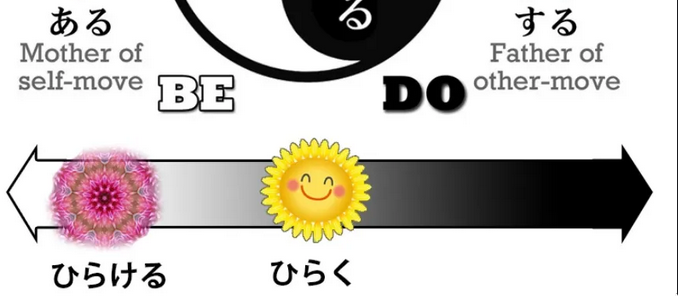Now, these are 開く, 開ける, 開く, 開ける. When we look at these at first they look like two self-move/other-move pairs, don't they? And up to a point they are.
The second thing we notice is that when you write them with kanji, you can't actually see the difference between あく/あける and ひらく/ひらける. Now this is partly because they are actually interchangeable in many cases and on the whole if it's not a case where it really needs to be ひらく/ひらける,
people will generally read あく/あける (Về cơ bản thì hai cặp này interchangable)
So first let's take the top two, あく・あける. あく is self-move. あくる is other-move. They both mean open. So, あく: a door opens, a bottle opens; あける: open a door, open a bottle.
開く (ひらく & あく)
The difference between あく and ひらく.
- They both mean
open.あくis officially speaking self-move, although we can see that there's a little bit of leeway here;ひらくis both self-move and other-move quite formally. - The difference between them has nothing to do with self-move or other-move. It has to do with the kind of opening that we're talking about. So if we talk about opening a bottle, taking the lid off a box, anything like that, it's definitely
あける. On the other hand, if we talk about a flower opening it's definitelyひらく. => So something that unfolds, opens out, isひらく. Something that simply becomes open instead of closed isあく・あける.
Now, there are various areas where these two are interchangeable, but even when they're interchangeable they stress one aspect rather than another.
And just a side note here: with an umbrella, which also spreads out and you might be inclined to say ひらく, we don't usually use that, it's generally さす for opening an umbrella.
開ける
Now, what about ひらける? The Japanese grammarians, or at least many of them, actually designate ひらける as the self-move version of ひらく.

The same with ひらける (Na ná trường hợp của 分かる). So it's used in cases like, for example, we often say 運が開ける, which means one's luck opens. Now, we could say 運が開く, and that would mean one's luck unfolds like a flower, becomes open, but ひらける implies not just unfolding but continuing to exist in that state of unfolded-ness.
The reason we would be more prone to say 店をひらく is partly because it's more other-move than ひらける and we're actually doing it to the shop, we're opening it; also because stress is on this act of opening the shop.